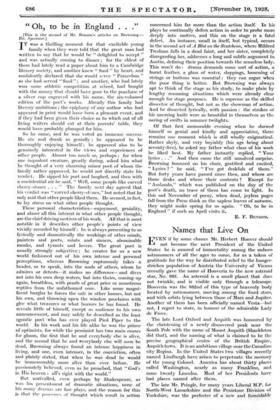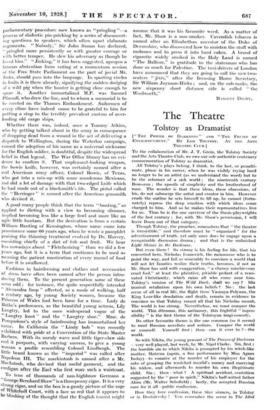Names that Live On
FYEN if by some chance Mr. Herbert Hoover should not become the next President of the United States he is assured of immortality among the unborn astronomers of all the ages to come, for as a token of gratitude for the way he distributed relief to the hunger- stricken population of Austria the University of Vienna recently gave the name of Hooveria to the new asteroid star, No. 932. •An asteroid is a small planet that does not twinkle, and is visible only through a telescope. Hooveria was the 932nd of this type of heavenly body located by astronomers, moving among the fixed stars, and With orbits lying between those of Mars and Jupiter. Another of them has been officially named Vesta—but not, I regret to state, in honour of the admirable Lady de Freee.
The late Lord Oxford and Asquith was honoured by the christening of a newly discovered peak near the South Pole with the name of Mount Asquith (Shackleton did that), and the naming of what is claimed to be the precise geographical centre of the British• Empire, Asquith town. It is an ambitious village near the Canadian city Regina. In the United States two villages "recently named Lindbergh have arisento perpetuate the memory of the young Colonel. America has about thirty places called Washington, nearly as many Franklins, and some twenty Lincolns. Most of her Presidents have had places named after them.
The late Mr. Pringle, for many years Liberal M.P. for North-West Lanarkshire and the Penist,one Division of Yorkshire, was the perfecter of a new and formidable parliamentary procedure. now known as "pringling "—a process of dialectic pin-pricking by a series of disconcert- ing questions to speakers, which often upset elaborate arguments. "Nobody," Sir John. Simon has declared, " pcingled more persistently or with greater courage or with better temper. He slew his adversary as though he loved him." :"Jinking," it has been suggested, apropos a famous abstention from voting at a momentous session of the Free State Parliament on the part of jovial Mr. Jinks, should pass into the language. In sporting circles in India it is there already, signifying the sudden dodging of a wild pig when the hunter is getting close enough to spear • it. Another immortalized M.P. was Samuel Plimsoll, who drew the line, and to whom a memorial is to be erected on the Thames Embankment. Sailormen of every clime have indeed cause to be grateful to him for putting a stop to the terribly prevalent custom of over- loading old cargo ships.
Whether there was, indeed, once a Tommy Atkins, who by getting talked about in the army in consequence of dropping dead from a wound in the act of delivering a dispatch to Wellington, during the Waterloo campaign, caused the adoption of his name as a universal nickname for the English soldier, is doubtful, despite the widespread belief in that legend. The War Office library has no evi- dence to confirm it. That unpleasant-looking weapon, the bowie knife, however, was certainly named after a real American army officer, Colonel Bowie, of Texas, who got into a mix-up with some murderous Mexicans, and did a lot of damage with that two-edged knife which he had made out of a blacksmith's file. The pistol called the "Derringer" is named after the American gunsmith who devised it.
A good many people think that the term " banting," as applied to dieting with a view to becoming slimmer, implied becoming less like a large fowl and more like an agile little bantam. But the derivation is from a certain William Banting of Kensington, whose name came into prominence some 60 years ago, When he wrote a pamphlet praising.the thinning treatment evolved by Dr. Harvey, consisting chiefly of a diet of fish and fruit. We hear less nowadays about "Fletcherizing " than we did a few years ago, but it is a term that continues to be used as meaning the patient mastication of every morsel of food before it is swallowed.
Fashions in hairdressing and clothes and accessories of dress have often been named after the person intro- ducing them. To the present generation some of these seem odd; for instance, the quite respectfully intended- " Alexandra limp" affected, as a mode of walking, half a century ago, by young Society women, because the Princess of Wales had been lame for a time. Lady de Bath&s, preferences, as the beautiful young actress, Lily Langtry, led to the once widespread vogue of the "Langtry knot" and the " Langtry shoe." Mme. de Pompadour's style of hairdressing has immortalized her hung, in. California the "Lindy bob" was recently exhibited with.pride at a Convention of the State Master Barbers. With its unruly wave and little tiger-claw side curl it purports, with varying success, to give a young Woman a profile resembling Colonel Lindbergh. The little beard known as the "imperial" was called after Napoleon HI. The mackintosh is named after a Mr. Macintosh, who devised that useful garment, and the cardigan after the Earl who first wore such a waistcoat.
To tens of thousands of non-highbrow Germans a " GeorgeBernhard Shaw" is ath.reepenny cigar. It is a very Strong cigar, and on the box is a gaudy picture of the sage ViT,Whall Court, with a face so red that it appears to be blushing at the thought that the English tourist might assume that it was his favourite weed. As a matter of fact, Mr. Shaw is a non-smoker. Cavendish tobacco is named after an Elizabethan ancestor of the Duke of Devonshire, who discovered how to moisten the stuff with molasses and to press it into hard cakes. A brand of cigarette widely smoked in the Holy Land is named "The Balfour," in gratitude to the statesman who has done so much for Palestine. The taxi-drivers of London have announced that they are going to call the new two- seaters " jixis," after the licensing Home Secretary, Sir William Joynson-Hicks ; and, on the cab-ranks, the new sixpenny short distance ride is called "the Woolworth."
BASSE'rr DIGBY,













































 Previous page
Previous page